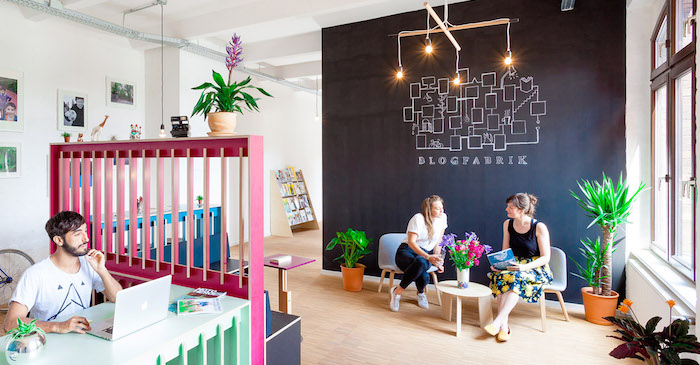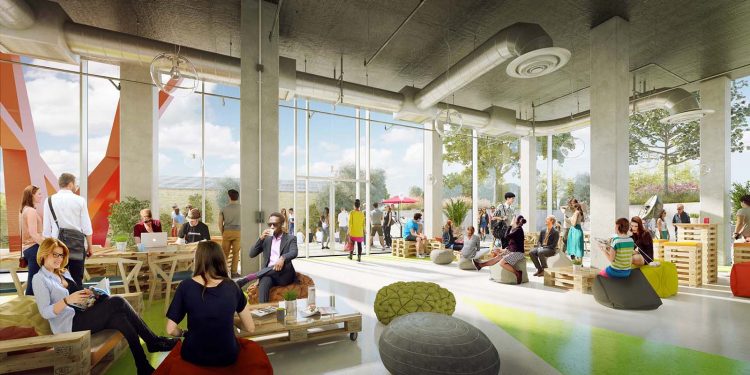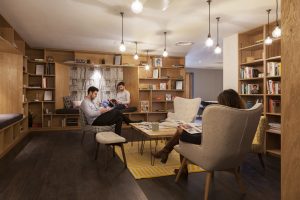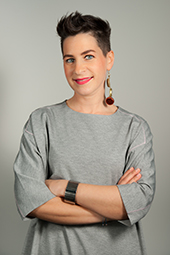You may have already heard about Blogfabrik, the Berlin-based coworking space that gives you a desk in exchange for your writing skills. The innovative concept behind this German coworking space has already garnered significant media attention, in addition to inspiring new ways of imagining coworking spaces, as not just based on traditional fees, but as service based platforms fueled by creative exchanges.
Recently celebrating it’s one year anniversary, we caught up with Blogfabrik’s lead project manager, Maria Ebbinghaus, to find out what it takes to build a community of trust and collaboration.
Hi, Maria. Can you please give us some details on how Blogfabrik operates as a space and also how it meets the needs of members?
Blogfabrik is a coworking space for content creators who are working and living in Berlin. The focus of our space is within digital publishing. The people who work at Blogfabrik pay for their desk in the form of various content, such as texts, photos, videos, etc. This content is then published in our online magazine DailyBreadMag, which is a result of our collective effort.
Overall, our goal is to create a strong network of media influencers by creating a new networking hub and think tank for media creation and distribution.
How do you manage to be self-sufficient without charging traditional memberships?
Fortunately, we are part of the powerful Melo Group, a Munich- based group specializing in media distribution, which both invested and supported us. They strongly believe in the future of digital publishing, so we are encouraged to experiment and try out different things. As a result, our creative agency has a very strong collaborative aspect. For different types of projects, we are able to combine various skill-sets and talents ultimately offering very creative solutions when it comes to content marketing.
What do you think that coworking could do for industries that focus heavily on social media and digital media?
Our coworking space gives passionate freelancers from the media a new home. We work with bloggers, Instagrammers and journalists who have a high media reach and strong communities in their following. To work side by side with a community of talented and innovative individuals has many advantages. For example, we can develop advertising campaigns, brainstorm on brand cooperations and a multitude of social media projects.
How could coworking help the media industry grow, become more interactive and overcome challenges?
Our space is ideal when it comes to deep networking. People exchange knowledge about their businesses all the time. Before, the blogging community was mostly meeting on roof-top brand parties. Today, they can meet each other in a professional working environment at Blogfabrik, where we really work to empower them and their business.

Maria Ebbinghaus, lead project manager at Blogfabrik
We also found that everybody faces similar challenges, so we focus on collaboration, rather than competition. I think that professional potential can be found within coworking and partnering in general.
What are the biggest challenges facing those working in media today?
Of course, low pay is still an issue and having enough projects available in order to make a living is also a constant struggle. Apart from daily hassles, we think there is a big challenge in the actual distribution of content and for those in media to be seen and recognized amongst the vast landscape of other media producers. Today, nearly everyone is fighting for the same thing, as the majority of people working in the online media industry depends on Google and Facebook when it comes to distribution of their content to their audience.
How does Blogfabrik work to overcome these challenges?
We try to empower content creators here at Blogfabrik and we truly believe in our coworkers. Through our agency, we offer them as many jobs as possible and by giving them a professional work environment they can learn to present themselves as qualified and skilled freelancers in order to attract more clients. Through close contact and many discussions amongst our community, we consistently aim to educate ourselves about the future of content and distribution, which is helping all of us to succeed.
What is the function of Blogfabrik’s in-house magazine?
For us, DailyBreadMag is the portfolio of the Blogfabrik community. One can find interesting information about the media industry and useful tips there.
Based on your experience, what could in-house publications do for other communities?
DailyBreadMag is not only a portfolio, it’s also our common working ground. We try to bring people together through projects, thus we make an effort to combine different members for articles or content projects, where they often work together for the first time. It’s the ultimate networking tool for the concept of Blogfabrik, and it also functions as our testing ground where we can experiment with different models of collaboration.
Overall, our magazine has a lot of very important functions for us and it is also an interesting case for our clients, which shows our expertise in content creation.
The coworking space model is evolving, from corporate spaces to coliving spaces, what direction do you see coworking going in from the perspective of a place like Blogfabrik?
The future of coworking is bright. We strongly believe in the creative power of freelancers and we know how important it is to love your working environment and your colleagues. To create a community like this is challenging but also very rewarding. People spend their vacation days at Blogfabrik which is a sign for us that they love to spend their free time with us and their coworkers. Perfect!
How could other niche spaces create a model like yours to encourage knowledge sharing?
I think that question is not so easy because we are a very special coworking space. I think the easiest way would be to create a common project that everyone benefits from with knowledge, networking, and of course, love!
Did you already registered for Coworking Europe 2016 (Brussels, Nov 28-29-30) ?





Recent Comments